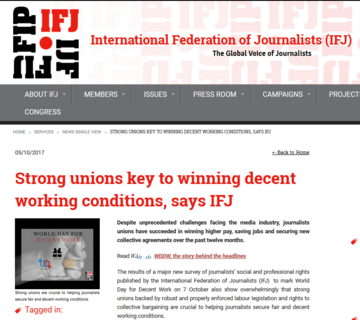
This digest was produced in cooperation with the European Federation of Journalists (EFJ)
The survey of 60 IFJ affiliates from every continent – released to coincide with the World Day for Decent Work – shows that attacks on collective bargaining, low pay, and a lack of rights for freelancers are threatening to further undermine working conditions for journalists across the globe.
A significant majority of unions surveyed highlighted a lack of collective bargaining, a lack of social rights, low pay, the widespread denial of rights to freelancers, and an increasing concentration of media ownership as the main challenges to achieving decent working conditions.
The economic crisis affecting many countries was also a factor in companies and governments undermining labour and social rights.
This decline in working conditions is also the main topic of the EFJ-ETUI report published in the latest issue of HesaMag, “Journalism, an increasingly precarious profession”.
Read HesaMag Special report online – Journalism, an increasingly precarious profession:
- Burnout among journalists, a symptom of discontent in newsrooms
- Desperately seeking news
- Freelancers: instruments and victims of deregulated working conditions
- ‘The market is detrimental to the free and independent production of information’
- An unemployed journalist among the Idomeni refugees
Overwhelmingly, respondents to the IFJ survey highlighted the benefits of union membership and action in tackling the challenges brought about by significant economic and technological changes happening throughout the media industry worldwide.
IFJ President Philippe Leruth said: “Once again there is a clear demonstration that without strong unions and rights to collective bargaining journalists face an increasingly precarious future – forced to work in conditions of poverty, corruption, or fear. Decent working conditions supported by strong unions guarantee quality and independence of information. For those who believe in justice, believe in fair working conditions, and believe in press freedom, the clear fact is you are better off in the union. I urge all journalists to join their local union, to join our fight for the social, labour, and professional rights of all journalists”.
Tags: WorldwideThe content of this article can be used according to the terms of Creative Commons: Attribution-NonCommercial 4.0 International (CC BY-NC 4.0) . To do so use the the wording "this article was originally published on the Resource Centre on Media Freedom in Europe" including a direct active link to the original article page.


